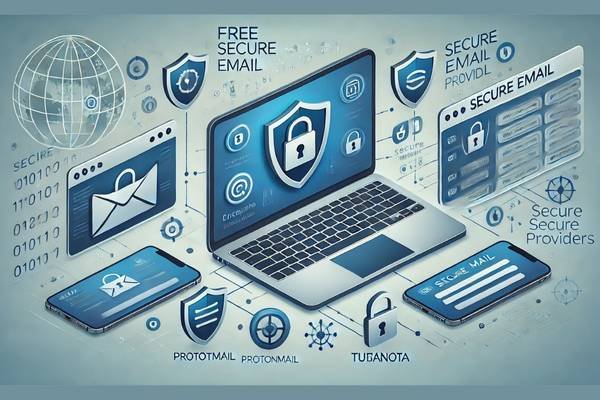
How to Transfer Your Data Safely to a Secure Email Provider
November 13, 2024
The Best Secure Email Providers for Personal Privacy
November 13, 2024Choosing the right email provider is crucial for digital marketing professionals, developers, and content creators who prioritize privacy and security. With increasing concerns about data breaches and surveillance, many users are exploring alternatives to mainstream services like Gmail and Outlook. This article will explore the top free secure email providers in 2025, evaluating their features, reliability, and potential limitations. If you’re considering switching to a more privacy-focused option, this guide will help you make an informed decision.
Table of Contents
1. Why Choose a Free Secure Email Provider?
Free email services are convenient, but they often come with a trade-off: your data may be used for advertising and analytics. Secure email providers, however, focus on privacy, offering features like end-to-end encryption and zero-access policies even with their free plans. This can be particularly valuable for users handling sensitive information or those who want to maintain a higher level of privacy.
Benefits of Free Secure Email Providers
- End-to-End Encryption: Ensures that only the sender and recipient can read the email content.
- Data Privacy: Many secure providers have strict no-logging policies.
- Cost-Effective: Offers strong privacy features without requiring a paid subscription.
- Compliance with Privacy Laws: Often adhere to regulations like GDPR, enhancing data protection.
Are Free Secure Email Providers Reliable?
While paid plans offer more features, free secure email services have improved significantly over the years. Many providers now offer robust encryption, reliable uptime, and essential security features at no cost. However, free plans often come with limitations, such as reduced storage or fewer customization options.
2. Top Free Secure Email Providers in 2025
To help you find the best free secure email service, we’ve compiled a list of top providers based on their features, security, and user experience.
1. ProtonMail: Best Overall for Privacy
ProtonMail, based in Switzerland, is one of the most popular secure email providers. It offers a high level of privacy with end-to-end encryption and a no-logging policy.
- Key Features:
- End-to-end encryption
- Open-source and privacy-focused
- Self-destructing emails
- Free Plan:
- 500 MB of storage
- Limited to 150 messages per day
- Pros: Strong encryption, user-friendly interface, Swiss privacy laws.
- Cons: Limited storage on the free plan.
Affiliate Link: Get ProtonMail for free and enhance your privacy
2. Tutanota: Best for Open-Source Security
Tutanota is a German-based secure email service that focuses heavily on privacy and open-source software. It provides end-to-end encryption and encrypted calendar services.
- Key Features:
- End-to-end encryption for emails and calendars
- No ads, no data tracking
- Custom domains for premium users
- Free Plan:
- 1 GB of storage
- Limited to Tutanota domains
- Pros: Excellent privacy features, open-source, encrypted search.
- Cons: Limited third-party app support.
Affiliate Link: Secure your communications with Tutanota’s free plan
3. Zoho Mail: Best for Business Users
Zoho Mail offers a free, ad-free email service that includes essential security features. While it is primarily designed for businesses, individuals can benefit from its secure, feature-rich interface.
- Key Features:
- End-to-end encryption and 2FA
- Integrated productivity tools (calendar, notes, tasks)
- Supports custom domains for business users
- Free Plan:
- 5 GB of storage
- Email hosting for a single domain
- Pros: Business-friendly features, strong security, no ads.
- Cons: May have a learning curve for beginners.
Affiliate Link: Try Zoho Mail’s secure free plan for business users
4. Mailfence: Best for Comprehensive Privacy
Mailfence, based in Belgium, offers a secure email service that includes end-to-end encryption, digital signatures, and an encrypted calendar. It is a great option for users who need a comprehensive suite of privacy tools.
- Key Features:
- OpenPGP encryption
- Encrypted calendar, documents, and contacts
- No ads or data tracking
- Free Plan:
- 500 MB of email storage
- 500 MB of document storage
- Pros: Strong privacy features, good integration with OpenPGP.
- Cons: Limited storage on the free plan.
Affiliate Link: Get started with Mailfence’s free secure email plan
5. StartMail: Best for Disposable Email Addresses
StartMail, from the creators of Startpage, focuses on user privacy and offers the unique feature of disposable email addresses, which can be particularly useful for avoiding spam.
- Key Features:
- PGP encryption support
- Disposable email addresses
- No tracking or data mining
- Free Trial:
- Offers a 30-day free trial of the premium plan
- Pros: Excellent privacy, disposable addresses.
- Cons: No permanent free plan; trial only.
Affiliate Link: Experience StartMail’s privacy features with a free trial
6. GMX Mail: Best for Basic Secure Email
GMX Mail offers a free email service with basic security features. It is a good choice for users who want a simple, straightforward email provider with some level of privacy.
- Key Features:
- Two-factor authentication
- Customizable email filters
- 65 GB of storage
- Free Plan:
- Generous storage limit
- Includes basic security features
- Pros: High storage capacity, simple interface.
- Cons: Lacks end-to-end encryption.
Affiliate Link: Try GMX Mail’s free email service
3. How to Choose the Right Free Secure Email Provider
When selecting a secure email provider, consider the following factors:
Factor 1: Encryption Level
Look for providers that offer end-to-end encryption, ensuring that your emails are fully protected. ProtonMail and Tutanota excel in this area.
Factor 2: User Interface and Usability
While secure email providers often prioritize privacy, some have simpler interfaces. If ease of use is important, consider services like Zoho Mail or GMX Mail.
Factor 3: Storage and Features
Free plans typically offer limited storage. If you handle large files frequently, a service like GMX Mail with higher storage might be a better fit.
Factor 4: Privacy Jurisdiction
Consider the jurisdiction of the email provider. Providers based in countries with strong privacy laws, like Switzerland (ProtonMail) or Germany (Tutanota), offer additional protection.
Top Free Secure Email Providers in 2025 Comparaison
| Feature | ProtonMail | Tutanota | Zoho Mail | Mailfence | StartMail |
|---|---|---|---|---|---|
| End-to-End Encryption | ✔️ | ✔️ | ✔️ | ✔️ | ✔️ |
| Free Plan Storage | 500 MB | 1 GB | 5 GB | 500 MB | Trial (30 Days) |
| Encrypted Calendar | ❌ | ✔️ | ✔️ | ✔️ | ❌ |
| Custom Domain Support | Premium Only | Premium Only | ✔️ | ✔️ | ✔️ |
Frequently Asked Questions
Is a free secure email provider as good as a paid one?
Free secure email providers offer strong privacy features, but they often have limitations in storage and advanced functionalities. Paid plans usually provide additional features and greater customization.
Can I use a free secure email provider for business purposes?
Yes, some free secure email providers, like Zoho Mail, are designed with business users in mind. However, for extensive business needs, upgrading to a paid plan may be necessary.
What is the most secure free email provider?
ProtonMail and Tutanota are among the most secure free email providers, offering end-to-end encryption, strict no-logging policies, and strong privacy protections.
Conclusion: Are Free Secure Email Providers Reliable?
Free secure email providers have come a long way in offering robust privacy features, making them a viable alternative for users seeking more control over their data. While they may have limitations compared to paid services, they still provide enhanced security and peace of mind, especially for users concerned about surveillance and data tracking.
If you’re ready to make the switch, consider starting with a free plan from a reputable provider like ProtonMail or Tutanota. These services offer strong encryption and reliable performance, making them excellent choices for digital marketing professionals, developers, and content creators in 2025.








